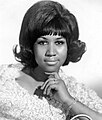Portal:Pop music
The Pop Music Portal
Pop music is a genre of popular music that originated in its modern form during the mid-1950s in the United States and the United Kingdom. During the 1950s and 1960s, pop music encompassed rock and roll and the youth-oriented styles it influenced. Rock and pop music remained roughly synonymous until the late 1960s, after which pop became associated with music that was more commercial, ephemeral, and accessible.
Identifying factors of pop music usually include repeated choruses and hooks, short to medium-length songs written in a basic format (often the verse–chorus structure), and rhythms or tempos that can be easily danced to. Much of pop music also borrows elements from other styles such as rock, urban, dance, Latin, and country. (Full article...)
Haim (/ˈhaɪɪm/ HY-im; meaning "life" in Hebrew, stylized HAIM) is an American rock band, based in Los Angeles, composed of three sisters, Este (bass guitar and vocals), Danielle (lead vocals, guitar, and drums), and Alana Haim (guitars, keyboards, and vocals). In addition to their primary instruments, each is proficient in several others.
The sisters grew up in a musical family, and began playing instruments from an early age in the cover band Rockinhaim, fronted by their parents, Moti and Donna. The two elder sisters, Este and Danielle, performed briefly with the pop group Valli Girls in 2005, releasing a few songs on soundtrack and compilation albums under that name. In 2007, they formed Haim with younger sister Alana, but did not seriously consider it a professional career for some years. After Danielle became a successful touring guitarist, first with Jenny Lewis and later with Julian Casablancas, Haim reformed as a full-time operation in 2012. (Full article...)Bad is the seventh studio album by the American singer-songwriter Michael Jackson. It was released on August 31, 1987, by Epic Records. Written and recorded between 1985 and 1987, Bad was Jackson's third and final collaboration with the producer Quincy Jones. Jackson co-produced and composed all but two tracks, and adopted an edgier image and sound, departing from his signature groove-based style and falsetto. Bad incorporates pop, rock, funk, R&B, dance, soul, and hard rock styles, and incorporated new recording technology, including digital synthesizers. The lyrical themes include media bias, paranoia, racial profiling, romance, self-improvement, and world peace. The album features appearances from Siedah Garrett and Stevie Wonder.
Nine singles were released, including a record-breaking five number ones: "I Just Can't Stop Loving You", "Bad", "The Way You Make Me Feel", "Man in the Mirror" and "Dirty Diana". Bad was promoted with the film Moonwalker (1988), which included the music videos for several Bad songs. The Bad tour, Jackson's first solo world tour, grossed $125 million (equivalent to $322 million in 2023), making it the highest-grossing solo concert tour of the 1980s. Jackson performed 123 concerts in 15 countries to an audience of 4.4 million. (Full article...)General images
"Halo" is a song recorded by American singer Beyoncé for her third studio album, I Am... Sasha Fierce (2008). Included on the I Am... disc, it was intended to give a behind-the-scenes glimpse of Beyoncé's life, stripped of her make-up and celebrity trappings. Columbia Records released the song, the album's fourth single, to mainstream radio in the United States on January 20, 2009, and to international markets from February 20. Inspired by Ray LaMontagne's 2004 song "Shelter", "Halo" was written by Ryan Tedder and Evan Bogart, with the former producing it alongside Beyoncé, who handled the vocal production. It was originally conceived by Tedder and Bogart specifically for Beyoncé, although there was media speculation that it had been intended for Leona Lewis.
"Halo" is a pop and R&B power ballad, the lyrics of which describe a sublime love. It features drum, piano, keyboard, string, synthesizer, and percussion instrumentation. The song faced a controversy when Kelly Clarkson claimed that Tedder had reused the musical arrangement in her own 2009 song "Already Gone". "Halo" received positive reviews from music critics, who made comparisons with Lewis's 2007 song "Bleeding Love", also written by Tedder. Its production and Beyoncé's vocals also received critical praise. "Halo" was nominated for Record of the Year and won Best Female Pop Vocal Performance at the 52nd Annual Grammy Awards. It won Best Song at the 2009 MTV Europe Music Awards. (Full article...)Did you know (auto-generated)

- ... that Mirror, a Hong Kong Cantopop music group which does not want to go for a "K-pop feel", performed Korean pop songs at a concert?
- ... that Eternal Blue, a metalcore album, was inspired in part by 1980s pop music?
- ... that 22-year-old singer Milena Warthon has created a new genre, pop andino, by fusing pop and Andean music?
- ... that the alt-pop musician Lucy Tun cites death metal and RuPaul's Drag Race as influences?
- ... that the first episode of the British pop music TV show Top of the Pops was broadcast on 1 January 1964 from Dickenson Road Studios, a converted church in Manchester?
- ... that Pachelbel's Canon is notorious for being widespread in pop music, but it actually isn't?
Selected image -

Related portals
Pop music by decade
WikiProjects
- Wikipedia:WikiProject Pop music was created with the purpose of assembling writers and editors interested in Pop music.
- The aim of this project is to standardize and improve articles related to the various genres of Pop music, as well as to create missing articles.
- To become a member of the WikiProject (anyone may join), simply click here and add your username.
| B | C | Start | Stub | List | Category | Disambig | Draft | File | Portal | Project | Redirect | Template | NA | ??? | ||||
| 117 | 0 | 1,570 | 1,097 | 3,620 | 10,751 | 6,610 | 109 | 436 | 1,670 | 4 | 152 | 252 | 1 | 23 | 1,318 | 1,890 | 11 | 1,015 |
Associated Wikimedia
The following Wikimedia Foundation sister projects provide more on this subject:
-
Commons
Free media repository -
Wikibooks
Free textbooks and manuals -
Wikidata
Free knowledge base -
Wikinews
Free-content news -
Wikiquote
Collection of quotations -
Wikisource
Free-content library -
Wikiversity
Free learning tools -
Wiktionary
Dictionary and thesaurus


































![Image 33Bing Crosby was one of the first artists to be nicknamed "King of Pop" or "King of Popular Music".[verification needed] (from Pop music)](http://upload.wikimedia.org/wikipedia/commons/thumb/4/4d/Bing_Crosby_1930s.jpg/96px-Bing_Crosby_1930s.jpg)
































